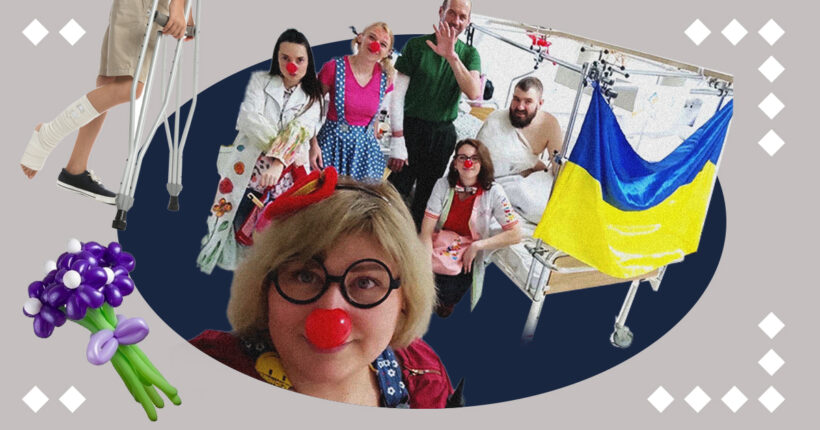
What's the problem?
Since Russia's full-scale war started in 2022, Ukrainian volunteers have been looking for ways to improve the stay of wounded soldiers in hospitals. Through fundraisers, they help medical facilities meet their needs for equipment, medications, and rehabilitation aids and provide wounded fighters with specialized clothing, hygiene products, books, and homemade treats.
Moral support is crucial from the first day a soldier checks into the hospital. Psychologists say considerate attention, human warmth, and a positive atmosphere can work wonders for patients despite the challenging circumstances soldiers find themselves in at hospitals.
What's the solution?
Hospital clowns stepped in to support psychologists and social workers. While they mainly work with children, clowns have taken on a new practice during the full-scale war also to uplift adults.
This type of support is just beginning to be used in Ukrainian hospitals. Rubryka spoke with the clown teams from "Red Noses" in the northwest city of Rivne and "Fine Noses" in the northeast city of Kharkiv to find out how it's done.
How does it work?
It all started with children
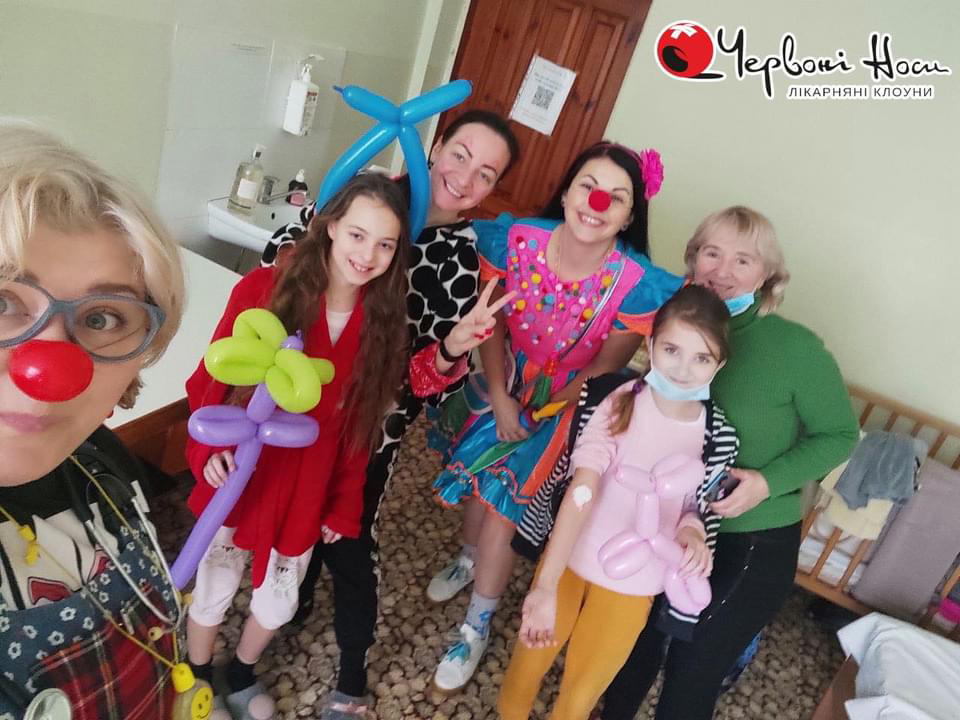
Clowns in the pediatrics department of the Municipal Children's Hospital, Rivne
Even though the "Red Noses" public clown care organization was founded in Rivne only a year ago, the history of hospital clowning in this city began long before that. Back in 2012, two volunteers, Taras Oboista and Artem Aleksieiev, supported by the "Treasure of Hope" charity foundation, started visiting oncology and neurology departments in Rivne children's hospitals. Initially, the two worked as entertainers during their first two or three visits. However, this arrangement proved ineffective in departments where children stay for a year or more. Games and tricks quickly ran out, and volunteers felt that children needed much more than just being spectators.
The hospital clowning system, which is 90% based on improvisation, changed everything. Working in the wards rather than in halls or playrooms, the clowns directly interacted with children, their parents, and medical staff. They not only entertained kids but also communicated with them, laughed, and played together. Soon, clown visits started to provide psychological relief to children, most of whom began to see clowns as friends, sharing their secrets and problems. Eventually, some patients who recovered from cancer joined the clown community.
The team of Rivne clowns grew, always learning and sharing experiences. The group that eventually started the NGO "Red Noses" essentially pioneered clown care in Ukraine and helped launch hospital clowning in Kyiv, Kharkiv, Zaporizhzhia, and other Ukrainian cities.
"Now, we have about 20 people on our team. We all volunteer after work. Among us are accountants, teachers, soldiers, university professors, social and banking workers, food florists, designers, deputies, and police officers," says Natalia Mykyta, the leader of the NGO Red Noses. In her everyday life, Ms. Natalia manages a homeless shelter, but in hospitals, she happens to be known as the clowness Kiku.
She continues: "Those who spend a long time within hospital walls really need support. We continue regularly visiting hospitals even in wartime, but our 'clients' now include not only children but also wounded soldiers."
"We tried, and we succeeded!"
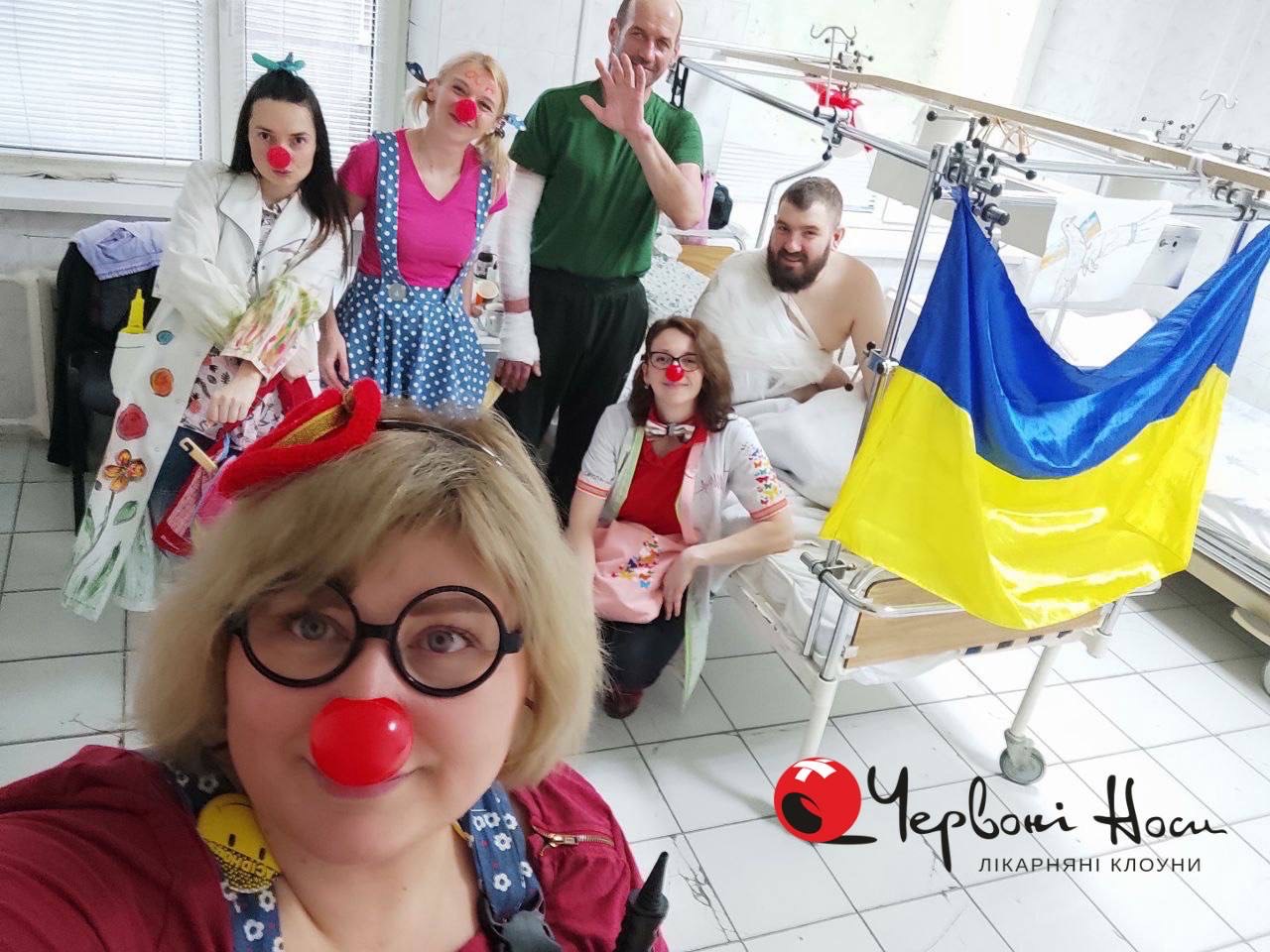
"Red Noses" at the hospital, Rivne
The community's first attempt at hospital clowning happened during the "Anti-Terrorist Operation," the Ukrainian counter-offensive, in response to Russia starting its military aggression in Ukraine's east in 2014. Members of the Rivne group visited the local hospital during a clown festival in the southern city of Odesa. Volunteer Artem Aleksieiev says wounded soldiers enjoyed this visit very much, but "Red Noses" hesitated to repeat this experience during the full-scale war.
What changed their decision is that one of the community members, Maria Burdova, aka clowness Poli, began volunteering in the burns department of the regional hospital in 2023. Maria, a former police officer with a background in psychology, always wanted to help people, so the question of whether to go to the hospital didn't even cross the woman's mind. She simply went.
"I just went to the hospital and asked permission [to visit soldiers]. I don't know where I got the strength to just walk into a ward with some of the most severe patients. I was scared to go there because I had no prior experience. But I had a powerful inner motivation to show soldiers that civilians care and that we are very grateful to them," says Maria Burdova, who read books to the guys in the wards and simply "held their hand."
"They welcomed me warmly. One of the soldiers, Oleksandr, called me a ray of sunshine. He loved it when I came and listened to stories about his family and life. Once, I mentioned hospital clowning to him. Oh, he got so curious then!" Maria recalls.
So, before long, hospital clowns visited patients.
"We had a good laugh. Then we asked [soldiers] if they liked it or not, and the guys said they hadn't laughed so much in a long time. And that, for a while, they even forgot about their pain. Thanks to this feedback, we started our project. And off we went," Maria says.
"If a person forgets about lying on a hospital bed for even five minutes, it's worth it"
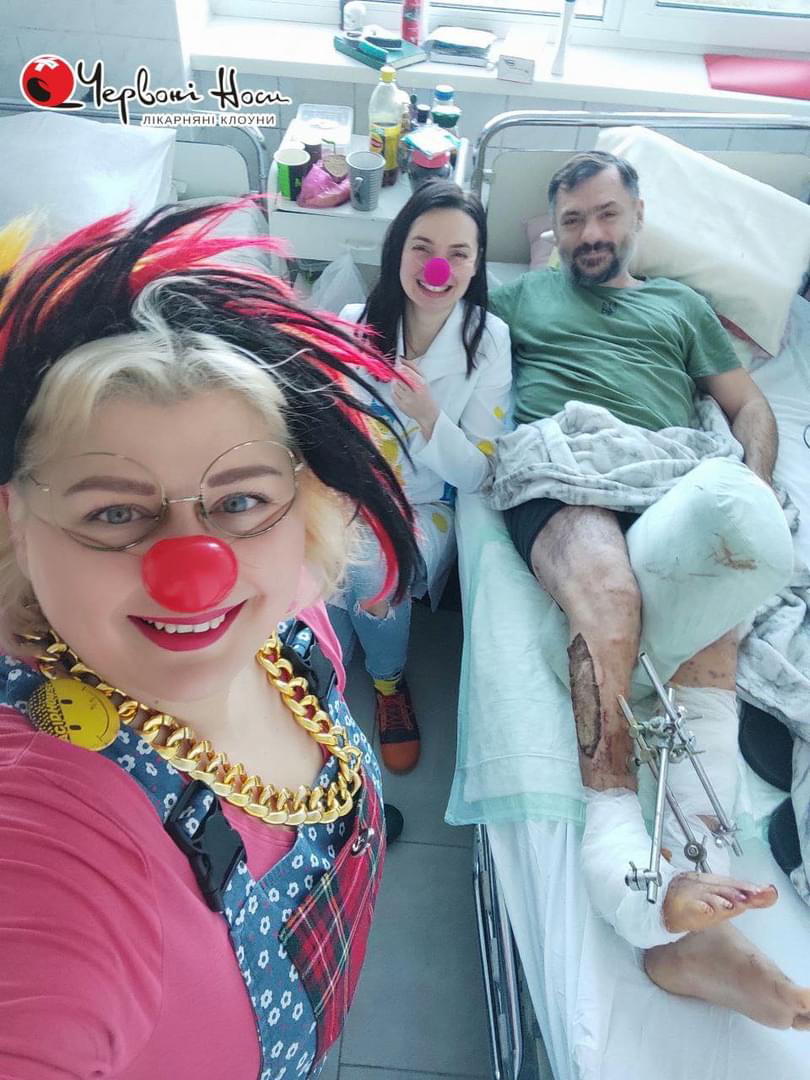
"Red Noses" Natalia Mykyta and Maria Burdova "make some noise" in the burns department
Hospital clowns usually work in small teams because the wards are large, and one person rarely can handle it. The primary rule is to do no harm.
"Before entering the ward, we always ask the guys if they want us. Being asked for consent is already very therapeutic because the sense of personal space is easily lost in the hospital, and we respect their boundaries," says Natalia Mykyta. "When they let us in, a real spectacle begins right there. We can't predict what exactly we'll do. We never use a script."
Of course, hospital clowns are always ready to use some tricks in their arsenal but can never foresee what will happen in the ward. Sometimes, they entertain the wounded, and sometimes just talk with them.
"So, we, clowns with noses, come and play something, try to joke. Usually, we're welcomed, and our conversations are supported in most cases," Natalia Mykyta shares. "Sometimes it happens that three soldiers let us in, and one patient in the ward is indifferent. He turns away, covers himself, and doesn't move. We don't insist because we understand not everyone is ready to engage with strangers like that. But when we come next time, we see he's taken off the blanket and listens to what we're saying. On the third visit, he initiates contact and enters into dialogue."
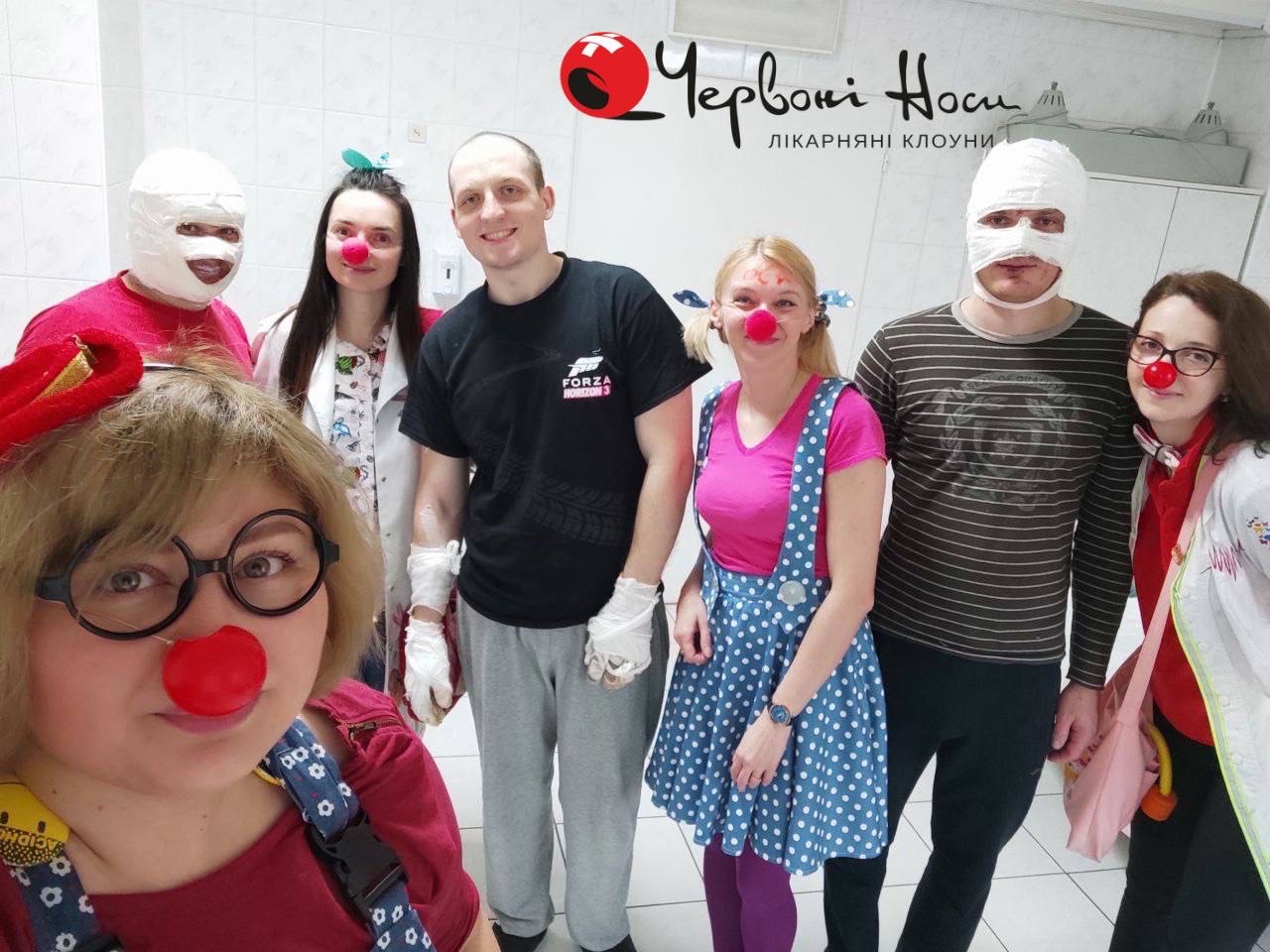
Rivne hospital clowns with wounded soldiers
Natalia and Maria say their team does everything to bring at least a little positivity and joy into the soldiers' hospital stays. Clowns know many songs and poems — they can perform something modern or classic, such as Queen's song repertoire. In winter, they caroled during the Christmas and New Year holidays and brought holy water on Epiphany Day. They also prepare small gifts for the children and wives of soldiers when they visit their loved ones. Sometimes, clowns play "weddings."
"We got this idea when we noticed that the soldiers' loved ones often visit them. So, we ask couples if they'd like to get married because we can organize everything!" says Maria Burdova. "If they agree, we involve everyone — ward neighbors, their relatives, and staff. We bring bread, salt, embroidered towels — everything according to Ukrainian traditions and rituals. And we play the 'wedding' for them with toasts and gifts. Some of the wounded soldiers might give the young couple a banana, an apple, or a card. We know that when we leave, they discuss it. The guys find it interesting, and we're glad we could lift their spirits a little."
Hospital clowning isn't just about laughter
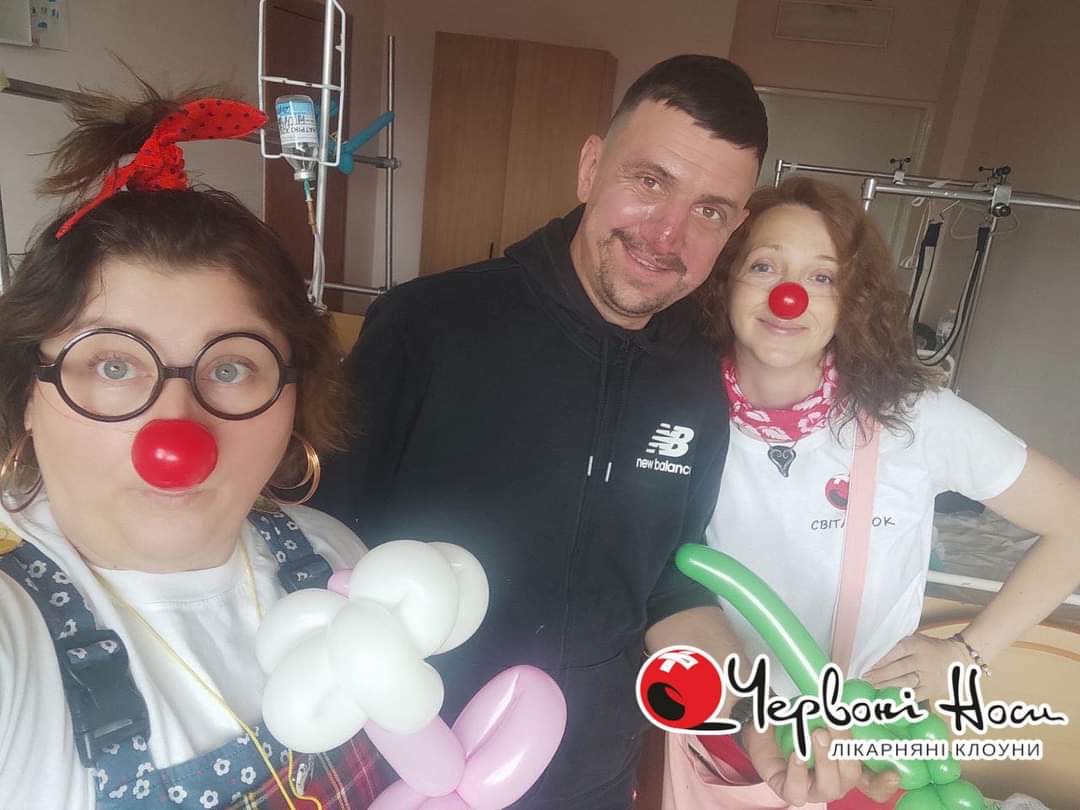
Clowns Kika (Natalia Mykyta) and Svitliachok (Oksana Svitlychna) with an injured soldier.
"We're not here just to make people laugh but to give our soldiers the attention they're missing right now. For instance, our team has a clowness, Svitliachok—Oksana Svitlychna. She's the 'sad' clown, more of a laid-back personality. When I'm being loud and funny, she quietly sits next to a soldier who's not engaging with others and usually gets them talking. Is that also psychology? Probably," Natalia Mykyta reflects.
She adds that hospital clowning is a flexible way to boost soldiers' moods. Through shared events, patients get to know each other and interact, all through smiles. This helps improve relationships with the staff, too.
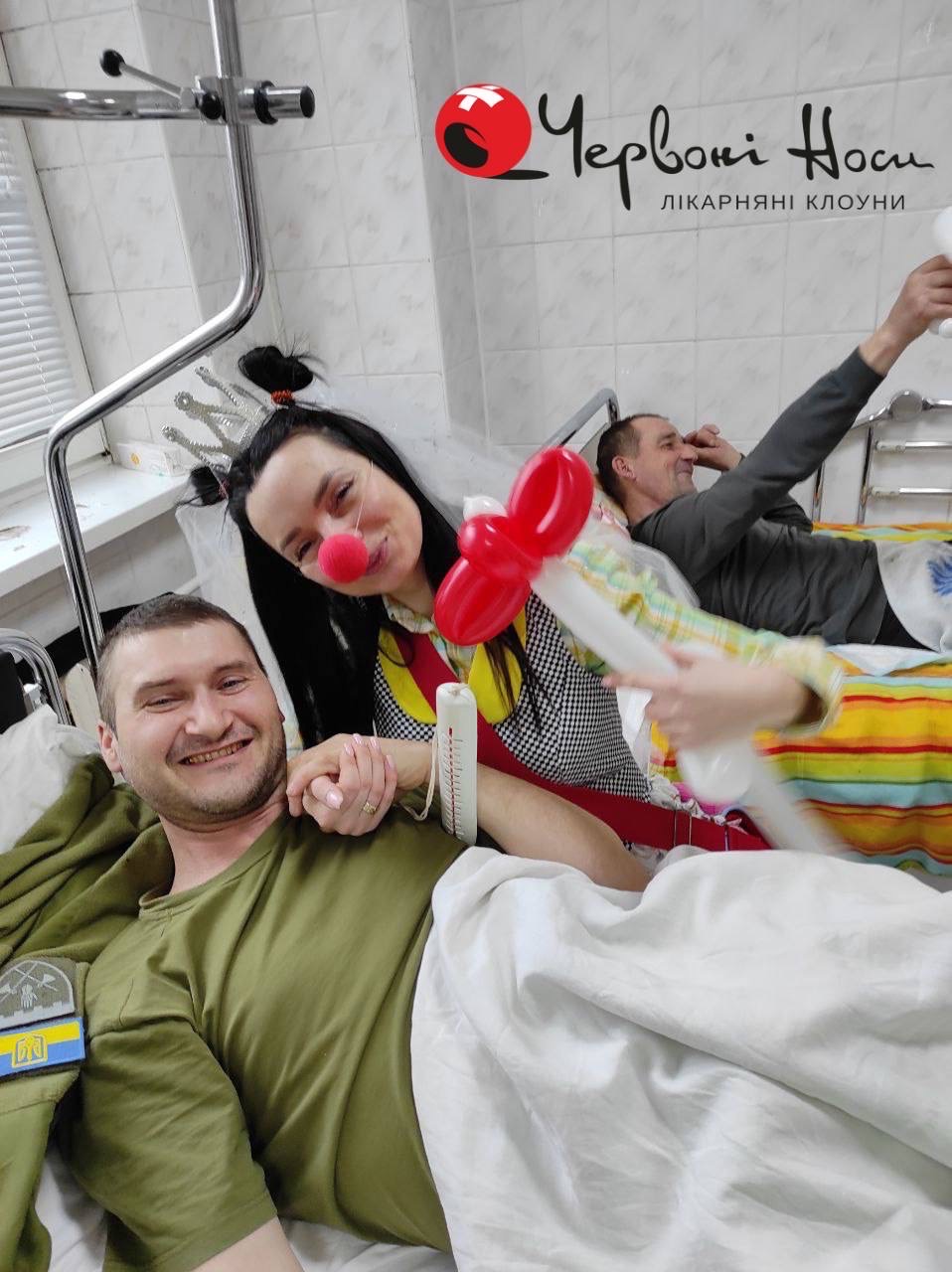
Maria Burdova as clowness Poli
Clowns never ask soldiers where they got injured or how and don't ask about their brothers-in-arms because those are very delicate and painful topics.
"Our wounded soldiers are exposed and very vulnerable. They also have a lot of fears. And that's normal," says Maria Burdova.
Psychologist Burdova explains that people in the trenches right now mostly weren't ready for war when it started. She believes that being prepared for it is impossible. As our psyche tries to defend itself by any means necessary, its reactions can be highly unpredictable. Soldiers tell stories that some of them develop irritable bowel syndrome, others freeze, and some cry during shelling. Others make decisions so quickly that they are amazed at themselves, but when they're safe later, stress catches up. Often, soldiers — both men and women — fear their reactions to hostilities. They're afraid to seem cowardly and not so knowledgeable in military affairs. They're also scared to appear brave, and dread calls from their wives, lovers, or mothers because they don't know what to say.
All these fears bring feelings of abandonment, helplessness, and anxiety that a person loses their strength. Then, the hospital room adds sorrow, causing guilt, shame, and listlessness. The patient doesn't see the point in treatment, especially if it's complex and lengthy, has no desire for life, and does not follow the doctor's instructions and recommendations. Recovery takes a longer time.
"We transform all these feelings into trust, gratitude, creativity, a sense of pride and respect. With us, the patient feels needed, important, and recognized! Later, I see it in their eyes. They comment and like our social media posts and wait for us to publish a photo with them," says Maria Burdova.
Does it really work?
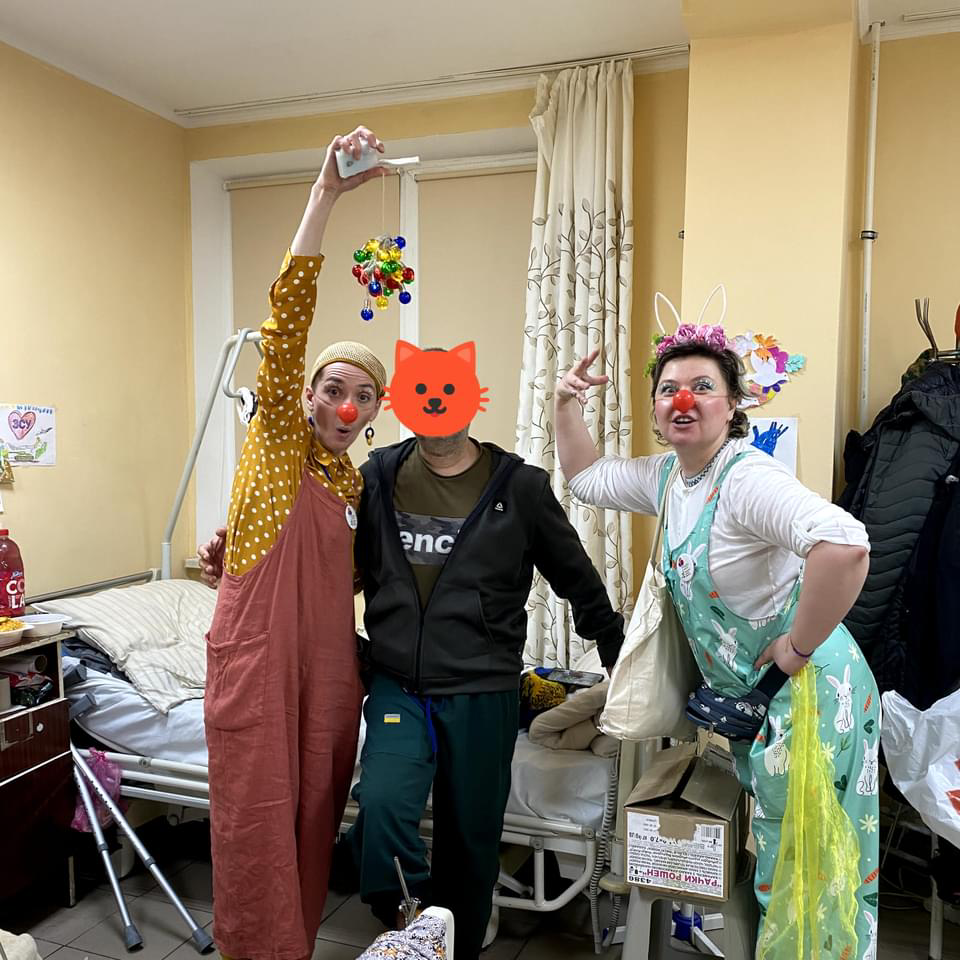
Visit of "Fine Noses" clowns to the hospital
Clown care for adults is starting to spread to other cities. Kharkiv recently welcomed a "Fine Noses Hospital Clowns" project of the nonprofit "Kharkiv Fund for Psychological Research," which developed the community, where most members are professional psychologists.
Tetiana Rohalina, a psychologist, grant writer, and hospital clown known as Liu, visits wounded soldiers and believes clown therapy is often crisis intervention, providing support here and now. The hospital clown's task is to see the patient and their current emotions and help them experience uncomfortable feelings.
"Hospital clowning, both for children and adults, has a pronounced impact, working as psycho-emotional support. The stereotype that it can only be relevant, beneficial, and interesting for children is outdated," says Tetiana Rohalina. "I view visits to hospitals through the prism of transactional personality theory, where a person can be in three positions: Adult, Parent, or Child. So, we usually find ourselves in the Child position when we need care and support in crises. Here, hospital clowning becomes understandable and appropriate."
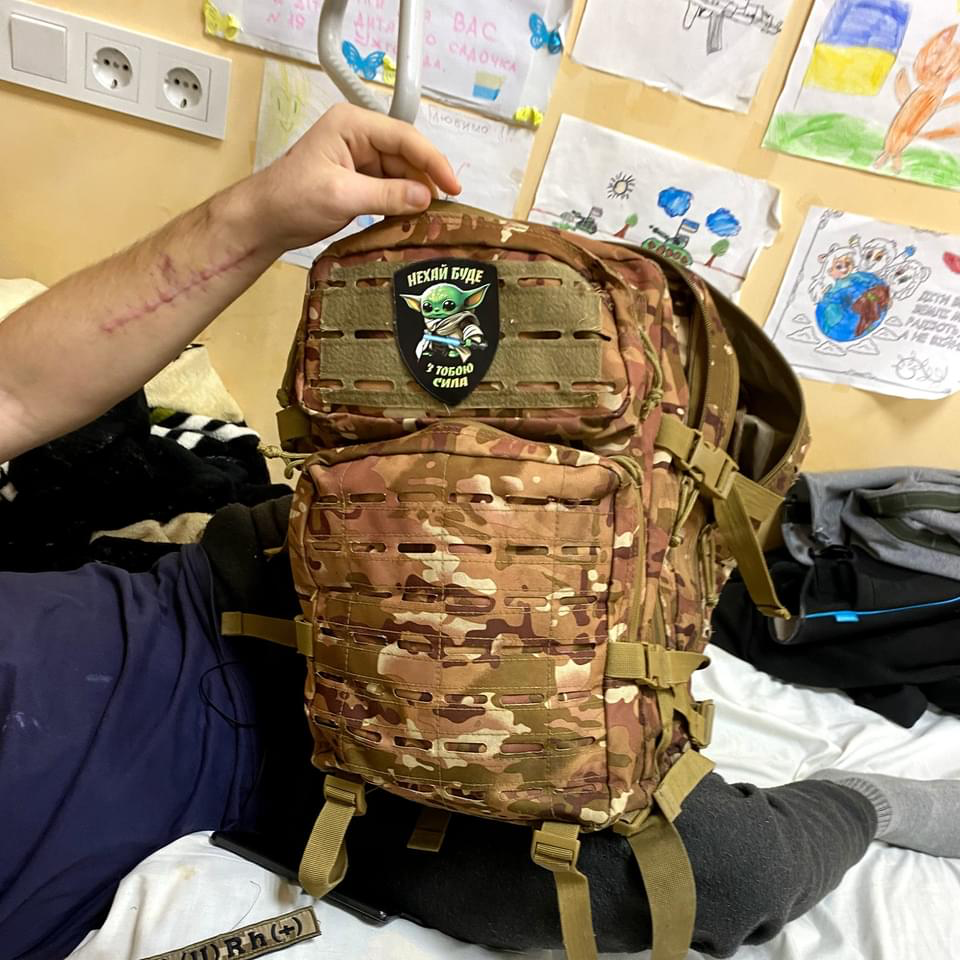
"Fine Noses" made and gifted such patches to soldiers
Ms. Tetiana notes that the work method certainly changes: children's songs and jokes are not used for adults. Hospital clowns are still searching for the ideal behavior formula to interact with wounded soldiers because they never know what they will face and what problems each patient has beyond the hospital room doors. Still, clowns can give attention to soldiers, shift their focus from pain, feel their suppressed emotions, and help patients experience them through play. The psychologist is confident that regular visits by professional hospital clowns yield the needed results for each individual, supporting the soldiers' drive to live and move on.
According to psychologist Tetiana Rohalina, hospital clowns need the support of friendly and non-skeptical healthcare workers. She lists many examples of clowns collaborating with rehabilitation specialists, which could increase patients' motivation for exercise. The recovery process becomes more interesting and easier when necessary exercises turn into games.
The psychologist believes that hospital clowning experience needs to be shared and spread to help adults throughout Ukraine.
"We need to host meetings to exchange experiences. Now, we are looking for grant competitions to win the funding we need to develop this idea," says Tetiana Rohalina.
Even more helpful solutions!
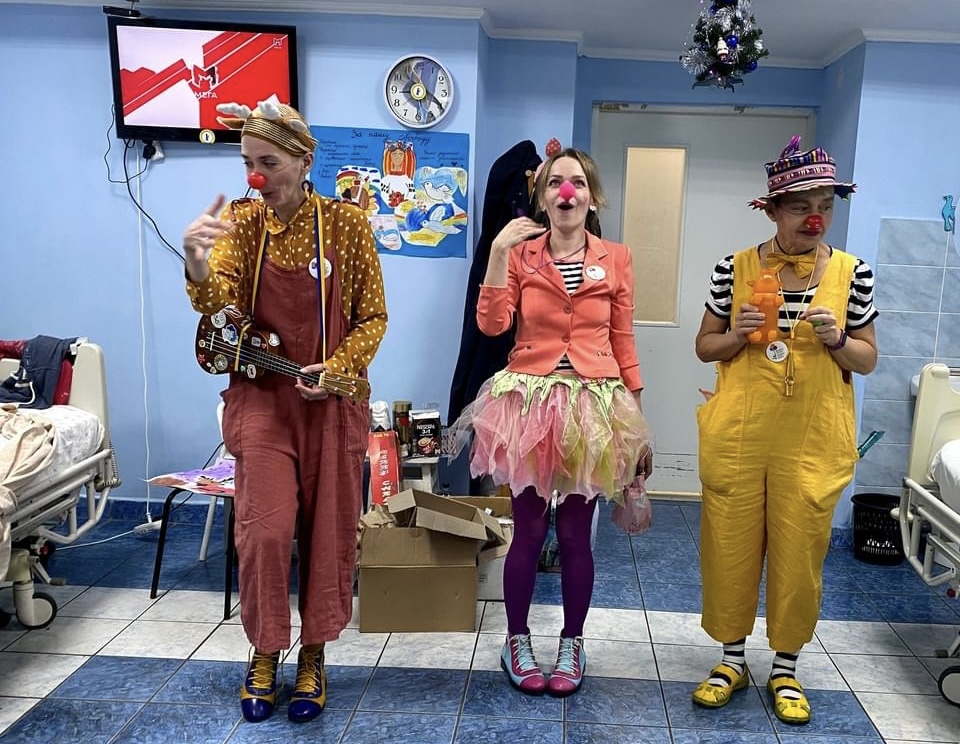
A song for soldiers performed by clowns from "Fine Noses"
Hospital clowning is now an established profession in most European countries and the United States, with its primary goal being to offer emotional support. For example, activists in Austria founded a non-profit organization, "Red Noses Clowndoctors," in 1994 and established the charity foundation "Red Noses International" (RNI) in 2003. RNI is now one of the world's largest groups of clown doctors, with local organizations in eleven countries. Its team has developed a wide range of initiatives within its programs, not only for sick or disabled children but also for older patients. Since 2014, RNI has collaborated with international organizations and sent specially trained clown teams on "Emergency Smile" missions to crisis areas.
Clown care in Ukraine currently exists only on a voluntary basis, but it is developing and finding the strength and courage to respond to the challenges brought by the war Russia unleashed against Ukraine.
Last year, the NGO "Kharkiv Fund for Psychological Research" held the National Hospital Clowning Conference. Teams of hospital clowns from the cities of Kharkiv, Rivne, Dnipro, Kyiv, and Zaporizhzhia participated in the event to exchange experiences and achievements. This event was meaningful for the community because hospital clowns from different cities had not seen each other since the beginning of the full-scale war.
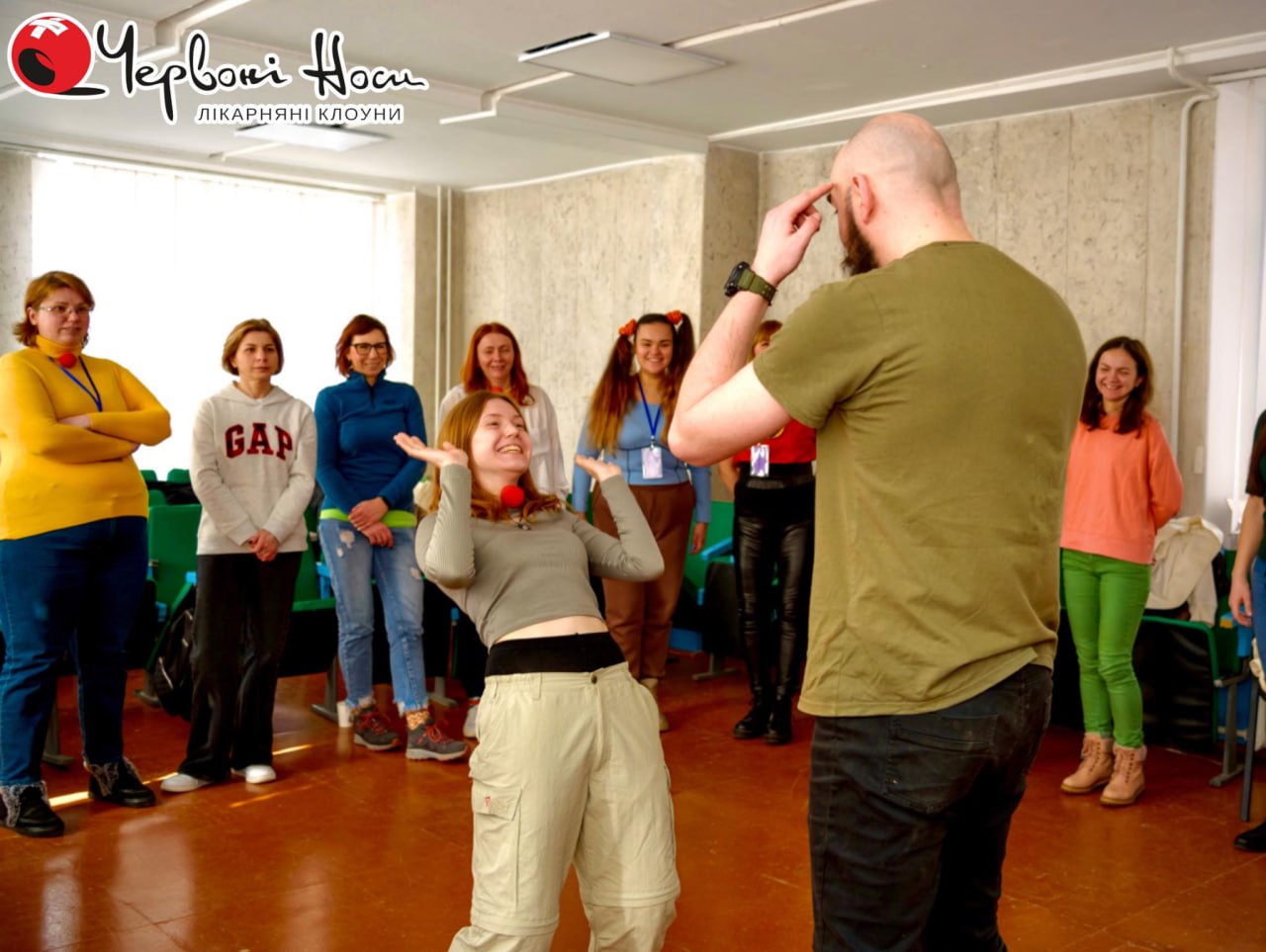
Training at the Hospital Clown School
The "Red Noses" nonprofit from Rivne launched the Hospital Clown School in March to recruit new people for their team. Volunteers believe more and more Ukrainians, both children and adults, need moral support as the war continues.
The training program includes lectures on the history and principles of hospital clowning, training on how to awaken the clown within oneself, and acting and improvisation classes.
The future hospital clowns will work in pairs to learn how to be "White" and "Red" clowns and will meet with doctors, psychologists, activists, and those who were helped by clown care in their work.
Over 20 people so far have sent in their applications to attend the school.
Newsletter
Digest of the most interesting news: just about the main thing






